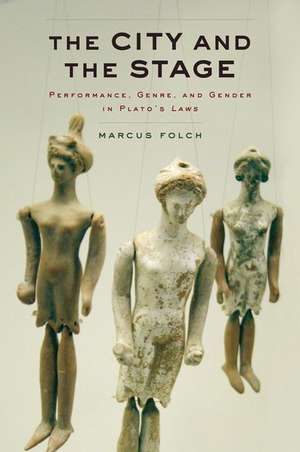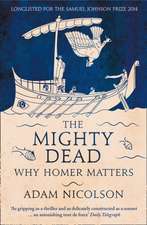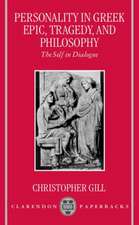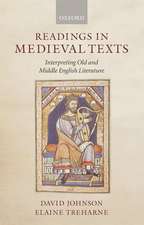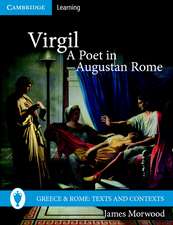The City and the Stage: Performance, Genre, and Gender in Plato's Laws
Autor Marcus Folchen Limba Engleză Hardback – 10 dec 2015
Preț: 553.80 lei
Preț vechi: 791.99 lei
-30% Nou
Puncte Express: 831
Preț estimativ în valută:
105.98€ • 110.24$ • 87.49£
105.98€ • 110.24$ • 87.49£
Carte tipărită la comandă
Livrare economică 03-09 aprilie
Preluare comenzi: 021 569.72.76
Specificații
ISBN-13: 9780190266172
ISBN-10: 0190266171
Pagini: 400
Dimensiuni: 157 x 236 x 36 mm
Greutate: 0.64 kg
Editura: Oxford University Press
Colecția OUP USA
Locul publicării:New York, United States
ISBN-10: 0190266171
Pagini: 400
Dimensiuni: 157 x 236 x 36 mm
Greutate: 0.64 kg
Editura: Oxford University Press
Colecția OUP USA
Locul publicării:New York, United States
Recenzii
The City and the Stage has made an important contribution towards arriving at a nuanced understanding of Plato's attitude to the arts of the Muses. The approach is original in that Folch reads Laws as an early contribution to the history of performance theory, literary criticism and cultural history; he thus reveals that there is a strong anthropological, cultural historical dimension in Laws' philosophy that has not been recognized thus far.
The City and the Stage is an engaging and informative study of a very interesting aspect of Plato's Laws, and Folch does well in selling the case for why more scholars should direct their attention to this neglected and much-maligned work.
Folch provides a worthwhile contribution to our understanding of an under-read Platonic dialogue.
The City and the Stage welcomes its readers warmly: the introduction states the author's aims clearly, situates the book in the context of current scholarship, clarifies its methodology and provides a careful overview of the Laws targeted at the non-specialist reader. ... With its sustained focus on performance and illuminating discussion of many elusive problems, to which this brief review cannot do justice, The City and the Stage is a very welcome addition to the recent flowering of studies on the Laws.
Folch's is impressive because it demonstrates convincingly the central role Plato would give to musical performance. In particular he shows how it provides the psychological underpinnings for the institutions and practices described in the dialogue. In this way it does much to elucidate what Plato has in mind when he has the Athenian insist that every institution in the city must serve to promote complete virtue among the citizens.
Folch's book is outstanding, full of original and exciting ideas. This is a major contribution to the field of classical studies.
This sophisticated analysis elucidates how Plato's ideal community would transform musical performance into training for citizenship. Working with themes of genre and gender, Folch offers a lucid and stylish examination that relates spectatorship to civic identity, and makes persuasive correlations between aesthetic, ethical and political concerns in Laws.
The City and the Stage is an engaging and informative study of a very interesting aspect of Plato's Laws, and Folch does well in selling the case for why more scholars should direct their attention to this neglected and much-maligned work.
Folch provides a worthwhile contribution to our understanding of an under-read Platonic dialogue.
The City and the Stage welcomes its readers warmly: the introduction states the author's aims clearly, situates the book in the context of current scholarship, clarifies its methodology and provides a careful overview of the Laws targeted at the non-specialist reader. ... With its sustained focus on performance and illuminating discussion of many elusive problems, to which this brief review cannot do justice, The City and the Stage is a very welcome addition to the recent flowering of studies on the Laws.
Folch's is impressive because it demonstrates convincingly the central role Plato would give to musical performance. In particular he shows how it provides the psychological underpinnings for the institutions and practices described in the dialogue. In this way it does much to elucidate what Plato has in mind when he has the Athenian insist that every institution in the city must serve to promote complete virtue among the citizens.
Folch's book is outstanding, full of original and exciting ideas. This is a major contribution to the field of classical studies.
This sophisticated analysis elucidates how Plato's ideal community would transform musical performance into training for citizenship. Working with themes of genre and gender, Folch offers a lucid and stylish examination that relates spectatorship to civic identity, and makes persuasive correlations between aesthetic, ethical and political concerns in Laws.
Notă biografică
Marcus Folch is Assistant Professor of Classics at Columbia University. His published work includes studies of ancient Greek literature, philosophy, and literary criticism, as well as classical reception in the 20th century.
